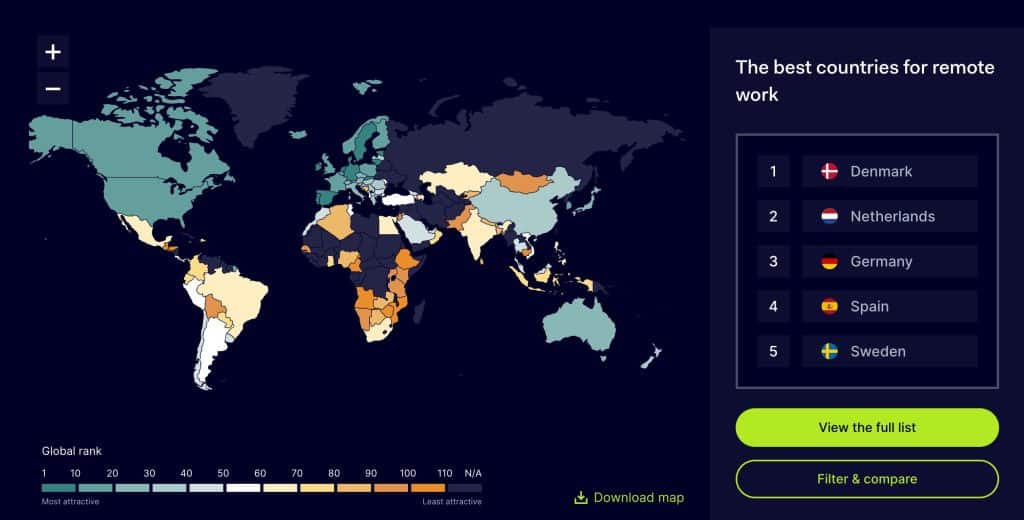The COVID-19 pandemic changed our work habits forever, ushering in an era where remote or hybrid working models are increasingly becoming the norm. This huge shift in where work is expected to occur prompts a pivotal question: where are the best places to work remotely?
The 2023 Global Remote Work Index, an extensive study conducted by cybersecurity firm Nordlayer, offers some insights.
Analyzing data from 108 countries, the report evaluates them across various parameters including healthcare, socio-economic factors, human rights protections, and internet stability.
The findings reveal an obvious trend, with Europe emerging as a leading destination for remote workers and taking all of the Top 10 positions.
Denmark stands out as the overall leader when considering factors such as social and economic security, digital and physical infrastructure, and cyber safety. This may not come as a surprise as Denmark also frequently tops the list of happiest countries on Earth in various indices over the last several years. Despite its high living costs and expensive internet, Denmark’s excellent internet quality, social inclusion, and healthcare services propel it to the top of the list.
Following closely are the Netherlands and Germany, each distinguished by their unique strengths. The Netherlands excels in personal rights, inclusivity, and social safety, while Germany boasts a robust legal system and the most affordable internet in addition to high economic security for remote workers.
Portugal presents a unique case. Ranking sixth overall, it offers a more affordable cost of living compared to its European counterparts. This positions Portugal as an attractive option for remote workers seeking value for money.
Related: 34 Best DIGITAL NOMAD VISAS Offered by Countries

Interestingly, the study notes that while European nations dominate the top ranks, they often lag in digital infrastructure compared to Asian countries. Singapore, South Korea, and the United Arab Emirates lead in this category, although their overall positions in the index are lower. This discrepancy highlights the diverse priorities and values across different regions.
The report also sheds light on countries that excel in economic security for remote workers. Nations like the United Kingdom, the United States, Australia, New Zealand, Germany, and Spain lead in this aspect, along with other countries like Malta. This also points to the reason why many digital nomads hail from these countries.
The European dominance in the index is notable, but it’s important to recognize the varying priorities of individuals when choosing a remote work location. Factors such as cost of living, internet affordability, and social benefits play significant roles in these decisions. One factor not mentioned in the index but also important for remote workers looking to save on transportation costs is the walkability of a city. Getting from one place to another quickly and cheaply often results in increased satisfaction among residents.
Overall, the 2023 Global Remote Work Index provides a comprehensive overview of the best places for remote work, considering a multitude of factors. It underscores the impact of the pandemic on our work habits and highlights the evolving nature of the global workforce. As remote work continues to be a significant aspect of our professional lives, understanding these dynamics becomes crucial for both individuals and organizations navigating this new normal.

